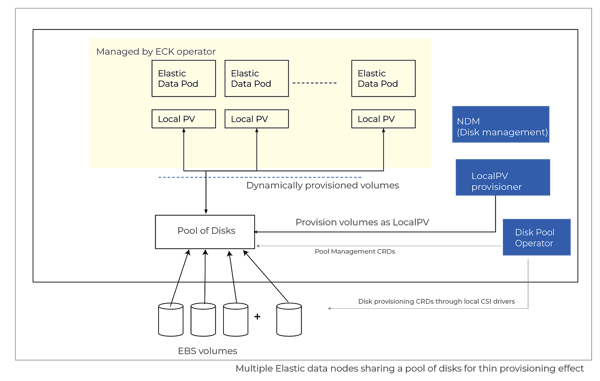Updated September 7th 2021: This blog is updated with the the latest guide on OpenEBS Local PV, please refer to https://github.com/openebs/dynamic-localpv-provisioner.
Using OpenEBS administrators can easily manage local PV storage resources for ECK seamlessly across both on-premises and multiple clouds, simplifying ElasticSearch ECK scaling and resilience while finally delivering a completely declaratively-managed application stack. Let's review how.
.png?width=2400&name=Untitled%20design%20(1).png) OpenEBS delivers the last mile of ECK
OpenEBS delivers the last mile of ECK
Good News: The recently shipped Elastic Cloud on Kubernetes (ECK) delivers Elasticsearch clusters as native, distributed Kubernetes Operators. Elasticsearch is a distributed, open source search and analytics engine for all types of data. Widely used, Elasticsearch is storage-intensive because it builds an inverted index of collections of JSON objects that are related to each other to allow very fast full-text searches. The result is a simplified deployment of ElasticSearch for the Kubernetes admins or SREs as well as a simplified developer experience.
Bad News: ElasticSearch uses fast local storage but it does not address storage provisioning and management. ECK use of the static provisioner for Local PV requires administrators to manually format, mount, and configure disks on Kubernetes nodes. This is a PITA, as they say.
Good News: OpenEBS removes the burden of Storage Operations for ECK Deployments. With OpenEBS, administrators can easily manage local PV storage resources for ECK seamlessly across both on-premises and multiple clouds, simplifying ElasticSearch scaling and resilience.
Vanilla K8s (PITA)
Typically, ElasticSearch is deployed one of two ways:.
- Dedicated mode: Elastic pods are using LocalPV which are real disks, and they need to be dynamically provisioned as the pods’ scale.
- Shared mode: Elastic pods are using LocalPVs from shared storage for better capacity economics.
Here is the detail on K8s static provisioners from K8s documentation
Note that the local storage provisioner is different from most provisioners and does not support dynamic provisioning. Instead, it requires that administrators preconfigure the local volumes on each node and if volumes are supposed to be
-
- Filesystem volumeMode (default) PVs - mount them under discovery directories.
-
- Block volumeMode PVs - create a symbolic link under discovery directory to the block device on the node.
The provisioner will manage the volumes under the discovery directories by creating and cleaning up PersistentVolumes for each volume.
This means a Kubernetes administrator must manually manage storage operations outside of the ECK operator itself. Specifically,
- Capacity resize of underlying volumes.
- Capacity management of shared storage when deployed in shared mode.
- Shifting of some of the data volumes from one node to another automatically in case a node has to be cordoned or drained.
- Move data to other Kubernetes clusters.
Note: insert administrator sweat equity here^.
OpenEBS LocalPV + Data Ops (Good)
An OpenEBS storage cluster, itself Kubernetes-native, simplifies and automates storage provisioning and management operations either on your data center or in the cloud (or spanning both!). OpenEBS provisioners use OpenEBS disk pool operators and built-in data management capabilities to dynamically provision LocalPVs in a host path or in a disk mode to ECK pods.

The ECK storage operations around capacity management
K8s Advantage: Declarative Data Plane
OpenEBS uses a Declarative Data Plane to manage storage operations which aligns architecturally with Kubernetes Operators generally, and specifically with the ECK operator. Storage is typically the last “architectural mile” of Kubernetes deployments. Storage has a gravity for applications that tends to tie Kubernetes clusters to the storage infrastructure beneath it. The OpenEBS Declarative Data Plane removes that last architectural mile by providing a completely Kubernetes-native software-defined storage infrastructure that spans on-premise and cloud resources and lets administrators manage Kubernetes application gravity consistently across all sites.
OpenEBS-managed storage means that the end-to-end operations of the entire Kubernetes application stack is finally managed, top to bottom, in a completely declarative way.
Configuring a Dynamic localPV for ECK
The StorageClass spec for OpenEBS LocalPV for automatically choosing an available disk on the node and mounting that disk with ext4 volume would look like the following:
cat <<EOF | kubectl apply -f -
apiVersion: elasticsearch.k8s.elastic.co/v1alpha1
kind: Elasticsearch
metadata:
name: quickstart
spec:
version: 7.2.0
nodes:
- nodeCount: 3
config:
node.master: true
node.data: true
node.ingest: true
volumeClaimTemplates:
- metadata:
name: elasticsearch-data # note: elasticsearch-data must be the name of the Elasticsearch volume
spec:
accessModes:
- ReadWriteOnce
resources:
requests:
storage: 10Gi
storageClassName: OpenEBS-LocalPV
EOFThe StorageClass spec for OpenEBS LocalPV for automatically choosing an available disk on the node and mounting that disk with ext4 volume would look like the following:
apiVersion: storage.k8s.io/v1
kind: StorageClass
metadata:
name: openebs-localpv-disk
annotations:
openebs.io/cas-type: local
cas.openebs.io/config: |
- name: StorageType
value: "device"
- name: FSType
value: ext4
provisioner: openebs.io/local
volumeBindingMode: WaitForFirstConsumer
reclaimPolicy: Delete
---In my next blog, I will give a simple tutorial of how to configure OpenEBS and ECK to realize the dynamic local PV allocations.
Summary
Using OpenEBS administrators can easily manage local PV storage resources for ECK seamlessly across both on-premises and multiple clouds, simplifying ElasticSearch ECK scaling and resilience while finally delivering a completely declaratively-managed application stack.






Game changer in Container and Storage Paradigm- MayaData gets acquired by DataCore Software
Don Williams
Don Williams
Managing Ephemeral Storage on Kubernetes with OpenEBS
Kiran Mova
Kiran Mova
Understanding Persistent Volumes and PVCs in Kubernetes & OpenEBS
Murat Karslioglu
Murat Karslioglu